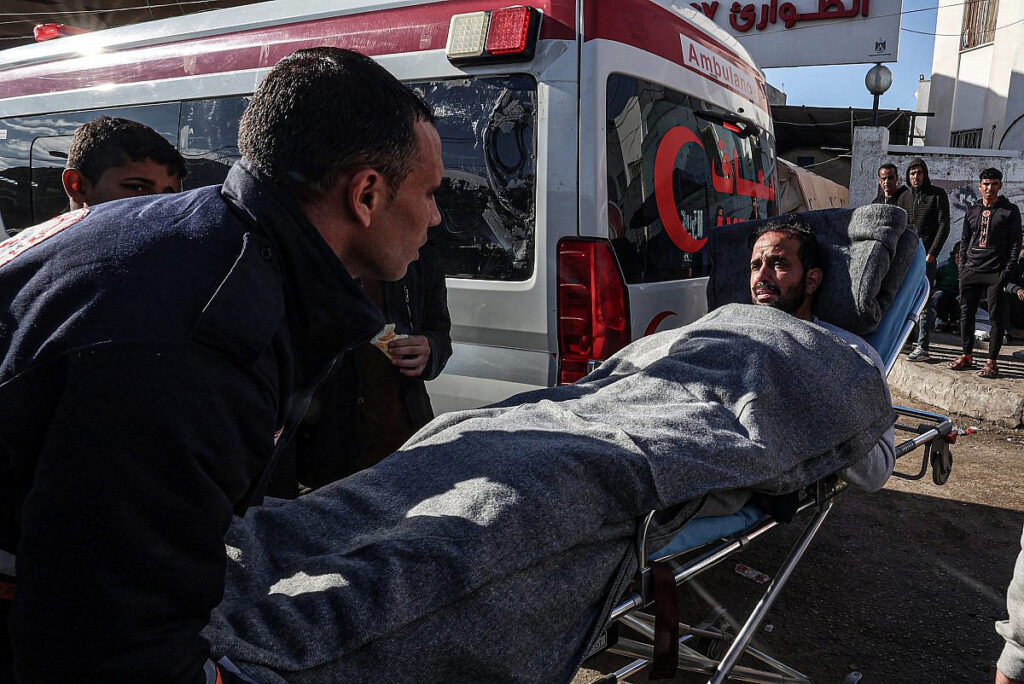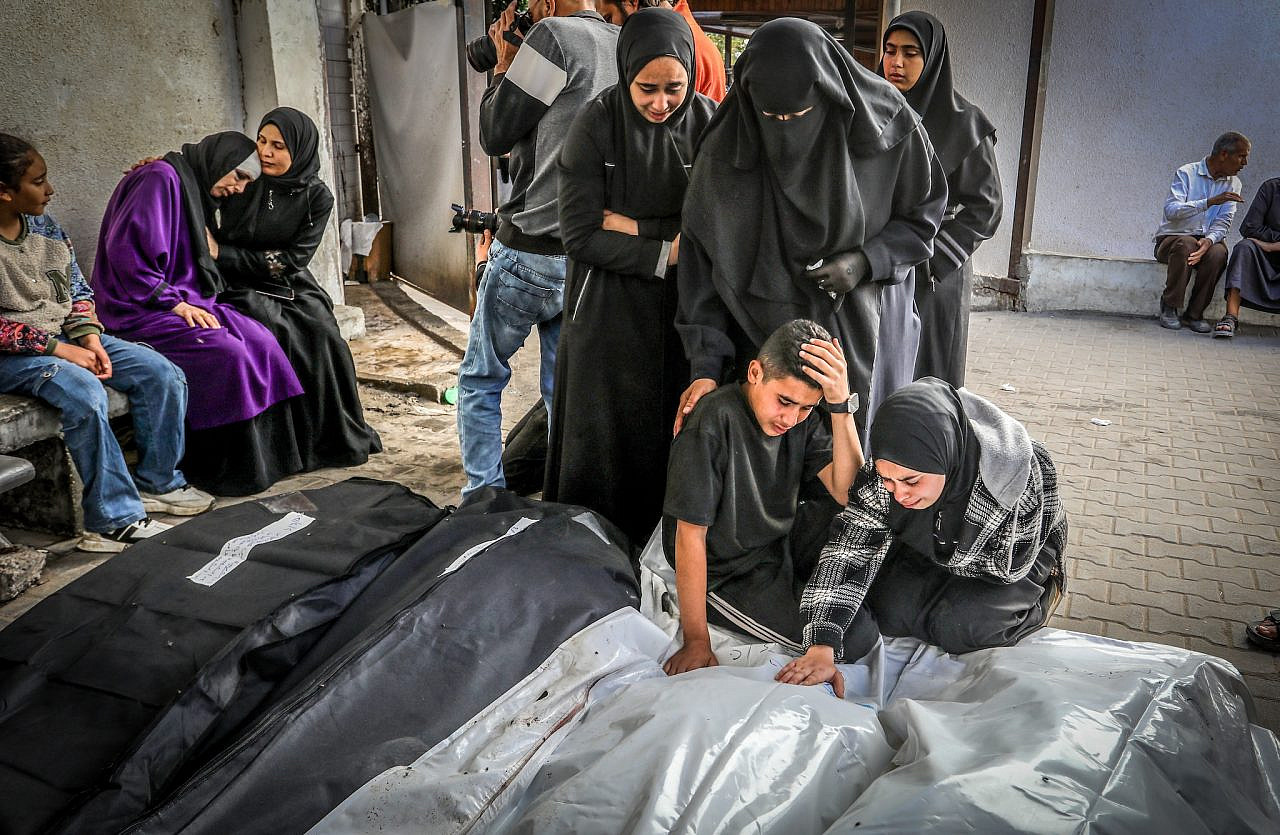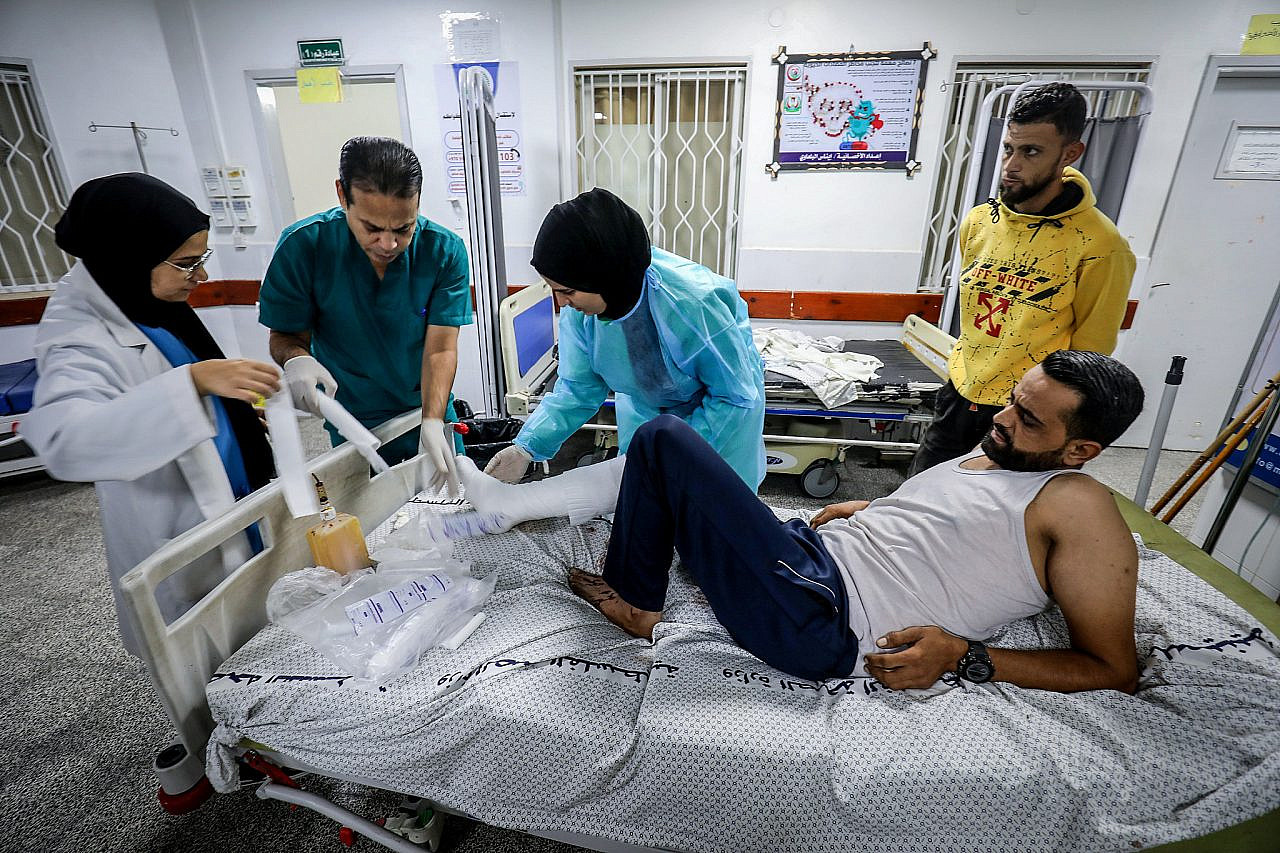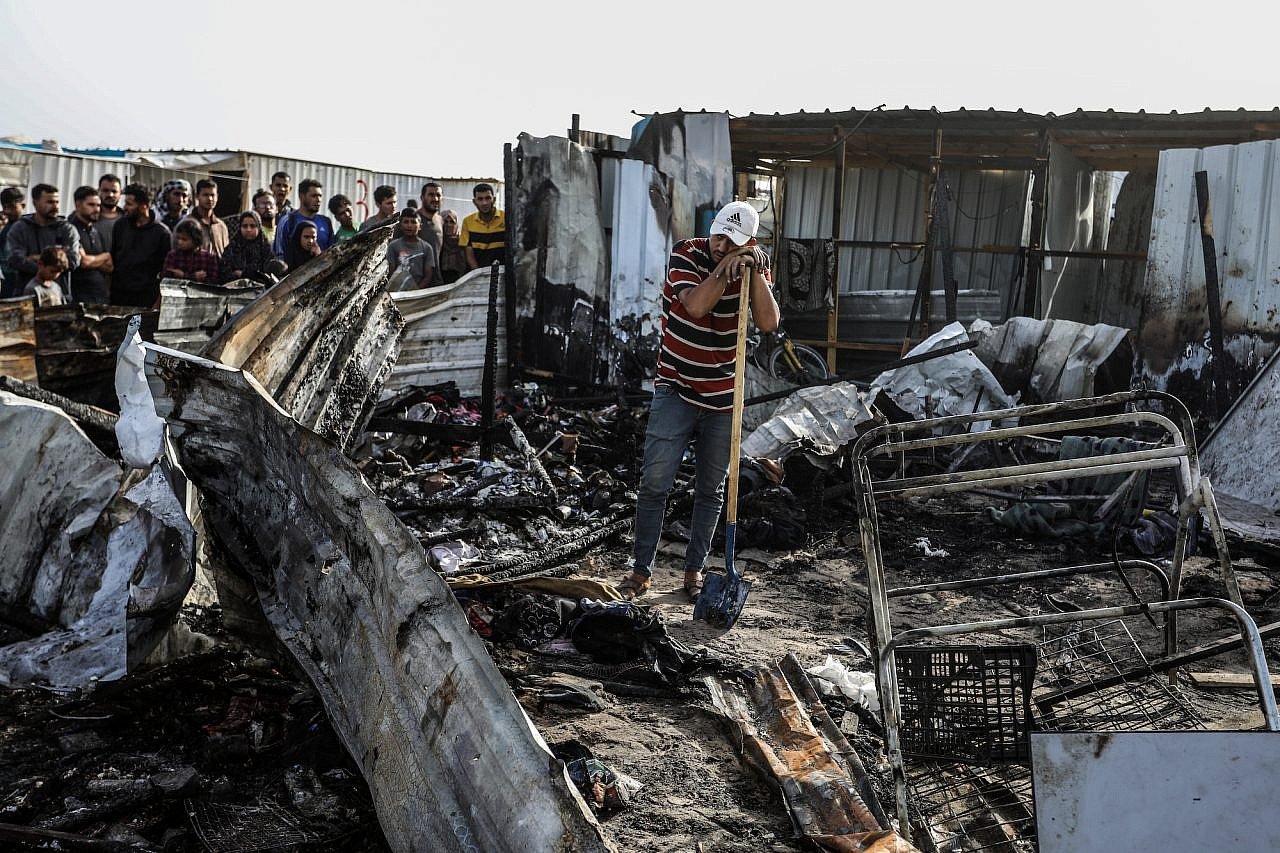‘We’re All at Risk’: Doctors Evacuate Rafah’s Last Hospitals
PALESTINE - ISRAEL, 17 Jun 2024
Ruwaida Kamal Amer | +972 Magazine - TRANSCEND Media Service

Palestinians are treated at Al-Najjar Hospital in Rafah, southern Gaza Strip, prior to its closure, February 1, 2024.
(Abed Rahim Khatib/Flash90)
Almost no facilities remain to treat the wounded in Gaza’s southernmost city, as doctors fear a repeat of Israel’s attacks on hospitals across the Strip.
5 Jun 2024 – On May 30, the World Health Organization announced that Rafah’s last remaining hospital, the Al-Helal al-Emirati Hospital, had gone out of service. The destruction of the southern Gaza city’s health care system, which comes after more than two dozen hospitals across the Strip have completely shut down as a result of Israel’s assault, encapsulates the human toll of the intensifying Israeli military operation in Rafah.
Far from the “limited” invasion that Israel’s leaders proclaimed, Israeli forces are currently occupying the heart of the city and remain in control of the Rafah Crossing and Philadelphi Corridor, while airstrikes continue to pummel camps for displaced families. Since Israel’s incursion began on May 6, more than 1 million Palestinians have fled Gaza’s last refuge.
In addition to the Emirati Hospital, the Abu Yousef al-Najjar Hospital and the Kuwaiti Hospital have been forced to cease all functions in recent weeks. With several smaller clinics closing too, all that remains to serve Rafah’s sick and wounded is two small field hospitals in the coastal area of Al-Mawasi — one run by the United Arab Emirates, and the other by the International Medical Corps — which are ill-equipped to deal with the scale of suffering among those unable or unwilling to flee the city.
With Israel’s ground invasion continuing to advance toward western Rafah, these remaining clinics may also soon be forced to evacuate. And while a trickle of seriously wounded patients had been leaving Gaza via the Rafah Crossing for treatment abroad, nobody has been able to escape the Strip since Israel occupied the crossing.
Muhammad Zaqout, the Gaza Health Ministry’s director general of hospitals, told +972 that staff at Rafah’s hospitals evacuated “because they feared a repeat of what happened at Nasser Medical Complex and Al-Shifa Hospital.” Israeli forces besieged and raided both hospitals in recent months, in Khan Younis and Gaza City respectively; after their withdrawal, mass graves containing hundreds of bodies were found at both sites.
“Hospitals in Tel al-Sultan [western Rafah] are being bombed by missiles and Quadcopter drones,” Zaqout explained. “The Indonesian field hospital was damaged, and the doctors there were terrified.” According to Gaza’s Health Ministry, nearly 500 healthcare workers have been killed as a result of Israel’s attacks across the Strip since October.
The field clinics that remain open, Zaqout added, “do not have advanced equipment to receive patients with serious injuries,” who must instead be transferred to the European Hospital near Khan Younis. This journey, he said, “requires an ambulance for an hour or more due to the long distance, the presence of [Israeli] tanks, and the continuous bombing of the city.”
Nasser Hospital in Khan Younis, Zaqout noted, is slowly starting to receive new patients again after having been forced to shut down during Israel’s raids on the complex. But it, too, is able to admit only a small number of the wounded who are transported from Rafah.
According to Zaqout, the situation is similarly desperate in northern Gaza amid continuing Israeli military operations: with Al-Shifa and Kamal Adwan Hospital both out of commission, Al-Ahli Hospital is the only major medical facility offering some services.
‘The Israeli army does not exclude medical personnel from its attacks’
Dr. Rima Sadiq, 29, worked at the Kuwaiti Hospital until it was forced to close on May 28. “We received a large number of casualties during the first days of the military operation,” she said. “The bombing never stops. With every [attack], we received at least 10 [patients with] injuries of varying severity. All injuries require treatment and follow-up, and the presence of a hospital near [the wounded] saves lives.”
Sadiq explained that the staff were eager to continue working to serve the city’s residents but they ultimately had no choice but to abandon the hospital. As Israel’s bombardment intensified, staff feared for their own lives and the lives of their patients, as well as the potential damage to medical devices and equipment.
“The situation has become very dangerous,” she said. “Two paramedics were martyred during their work to transport the wounded. The Israeli army does not exclude medical personnel from its [attacks]. We are all at risk of being targeted or arrested.”
“There are patients who were forced to leave the hospital in poor condition who require follow-up,” Sadiq continued. “Field hospitals are unable to receive large numbers [of patients] due to their clinical capacity and lack of treatments.” The lack of food, she added, only worsens their conditions and prevents a full recovery.
Yet just as the ability of Rafah’s health services to treat the wounded declines, the need is becoming ever greater. As Israel’s ground assault intensifies, so have the army’s attacks on Palestinians who remain in the city — including in areas it had designated as “safe zones” such as Al-Mawasi and Tel al-Sultan.
Around 45 Palestinians were killed in a single attack on a refugee camp on the night of May 26, when much of the encampment was engulfed in flames and many burned to death inside their tents. Another attack two days later on tents in Al-Mawasi killed 21.
‘We saw tents catching fire and children burning inside’
Marwa Asraf, 38, witnessed the attack on Al-Mawasi. Originally from Beit Hanoun in the north, Asraf was displaced to Al-Mawasi with six of her family members. “What we are experiencing in this area is terrifying,” she told +972. “We do not feel safe at all. Shells and missiles are falling continuously.”
At the time of the Al-Mawasi bombing, Asraf had gone to search for water for their family. “I left my children with their father and grandmother,” she recounted. “Suddenly, I heard the sound of an explosion and then the screams of the displaced people. I fell to the ground from the intensity of the sound. I was crying. I thought that my children had been bombed.
“I started running mindlessly, and left the water jug on the ground,” Asraf continued. “I returned to the tent and found my children crying. Their grandmother was crying, too; she told me that my husband Ahmed ran toward the tents to check on the wounded, and that she was very concerned for him. I did not believe that my children were okay. One displaced person staying near us was killed when shrapnel entered the tent.
“This situation is very tiring,” she went on. “We are tired of being displaced from the northern Gaza Strip, for eight months, and we are waiting to return to our homes. We were a little reassured because we were in a ‘safe area,’ but whoever says that is a liar. We lost more than seventy people, including women and children, while they were in their tents.”
Beyond its emotional cost, Asraf explained, constantly relocating with her family has taken a financial toll. “We need to hire a taxi to take us to a new place every time we have to move. We spent all our money during this war just to buy basic necessities. Now I very much regret [leaving] the north. I wish I had stayed there and died in my home instead of here in the area they said was safe.”
Riyad Rawida, 43, was also displaced to Al-Mawasi from his home in the center of Rafah. He fled with 20 of his relatives after they spotted Israeli tanks penetrating the Zoroub roundabout area, approaching Tel al-Sultan. “We began to hear shelling and clashes,” he recalled. “We saw people leaving their homes and fleeing to Al-Mawasi. Tel al-Sultan became almost empty. We had no choice.”
____________________________________________
Ruwaida Kamal Amer is a freelance journalist from Khan Younis.
Tags: Anglo America, Colonialism, Crimes against Humanity, Ecocide, Ethnic Cleansing, Famine, Gaza, Genocide, Genocide Convention, Hamas, Hunger, International Court of Justice ICJ, International Criminal Court ICC, Israel, Israeli Apartheid, Israeli occupation, Massacre, Palestine, Protests, Rafah, Students Anti-Genocide Gaza, USA, United Nations, War crimes, West Bank, Zionism
Join the BDS-BOYCOTT, DIVESTMENT, SANCTIONS campaign to protest the Israeli barbaric siege of Gaza, illegal occupation of the Palestine nation’s territory, the apartheid wall, its inhuman and degrading treatment of the Palestinian people, and the more than 7,000 Palestinian men, women, elderly and children arbitrarily locked up in Israeli prisons.
DON’T BUY PRODUCTS WHOSE BARCODE STARTS WITH 729, which indicates that it is produced in Israel. DO YOUR PART! MAKE A DIFFERENCE!
7 2 9: BOYCOTT FOR JUSTICE!
DISCLAIMER: The statements, views and opinions expressed in pieces republished here are solely those of the authors and do not necessarily represent those of TMS. In accordance with title 17 U.S.C. section 107, this material is distributed without profit to those who have expressed a prior interest in receiving the included information for research and educational purposes. TMS has no affiliation whatsoever with the originator of this article nor is TMS endorsed or sponsored by the originator. “GO TO ORIGINAL” links are provided as a convenience to our readers and allow for verification of authenticity. However, as originating pages are often updated by their originating host sites, the versions posted may not match the versions our readers view when clicking the “GO TO ORIGINAL” links. This site contains copyrighted material the use of which has not always been specifically authorized by the copyright owner. We are making such material available in our efforts to advance understanding of environmental, political, human rights, economic, democracy, scientific, and social justice issues, etc. We believe this constitutes a ‘fair use’ of any such copyrighted material as provided for in section 107 of the US Copyright Law. In accordance with Title 17 U.S.C. Section 107, the material on this site is distributed without profit to those who have expressed a prior interest in receiving the included information for research and educational purposes. For more information go to: http://www.law.cornell.edu/uscode/17/107.shtml. If you wish to use copyrighted material from this site for purposes of your own that go beyond ‘fair use’, you must obtain permission from the copyright owner.
Join the discussion!
We welcome debate and dissent, but personal — ad hominem — attacks (on authors, other users or any individual), abuse and defamatory language will not be tolerated. Nor will we tolerate attempts to deliberately disrupt discussions. We aim to maintain an inviting space to focus on intelligent interactions and debates.
Read more
Click here to go to the current weekly digest or pick another article:
PALESTINE - ISRAEL:


